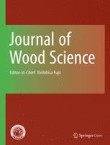
Photo from archive.org
Termites are ecologically significant in positive and negative ways; their role in breaking down debris greatly benefits forest environments, but this activity renders them a pest in domestic environments. This… Click to show full abstract
Termites are ecologically significant in positive and negative ways; their role in breaking down debris greatly benefits forest environments, but this activity renders them a pest in domestic environments. This study examines the effect of nutrition on the feeding preference of termite Coptotermes formosanus Shiraki. Among 11 nutrition options tested, dipotassium phosphate (DKP) most significantly increased feeding consumption in the multiple feeding choice test. The mean feeding amount of the DKP-treated sample was 2.5-fold higher than that of the deionized water-treated control. This result suggests that termite colonies are deficient in phosphorus, and an additional supply of phosphate can promote feeding. The result of a no-choice feeding test using DKP shows that DKP does not promote feeding in a small number of termites. The results obtained in this study suggest that phosphorus is needed in termite colonies, making DKP especially effective. DKP will help to improve bait technology, because it is inexpensive and safe for both humans and the environment.
Journal Title: Journal of Wood Science
Year Published: 2020
Link to full text (if available)
Share on Social Media: Sign Up to like & get
recommendations!